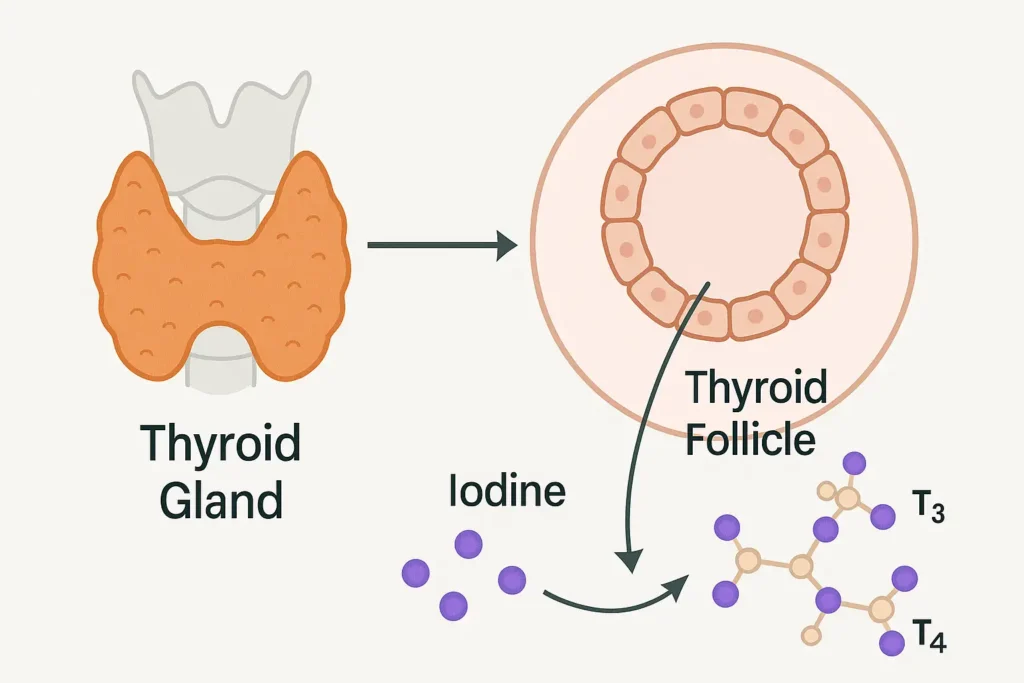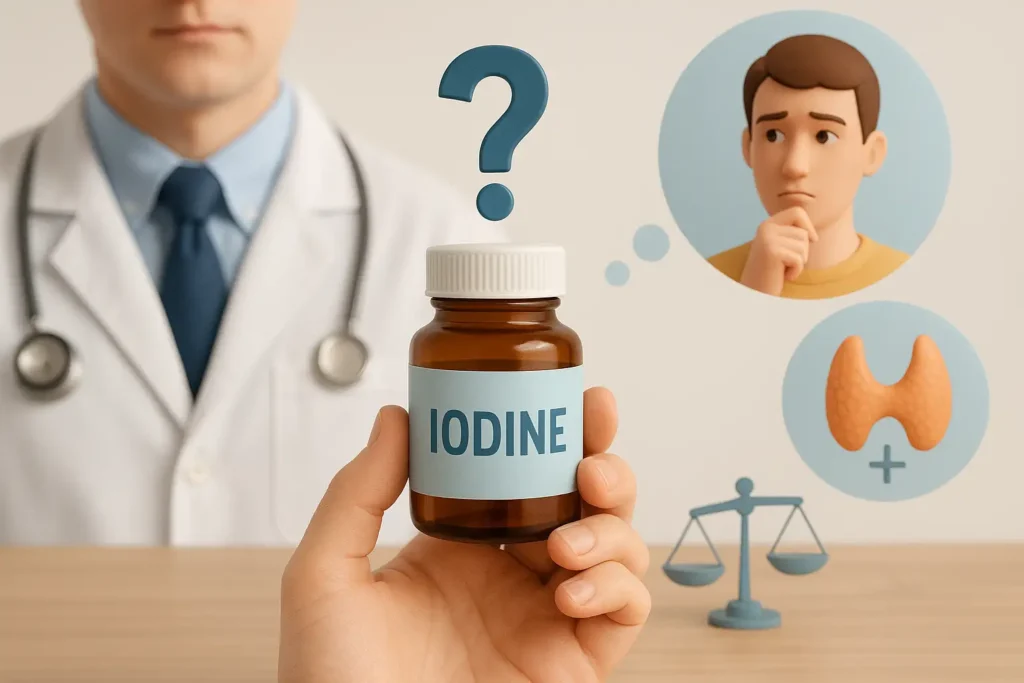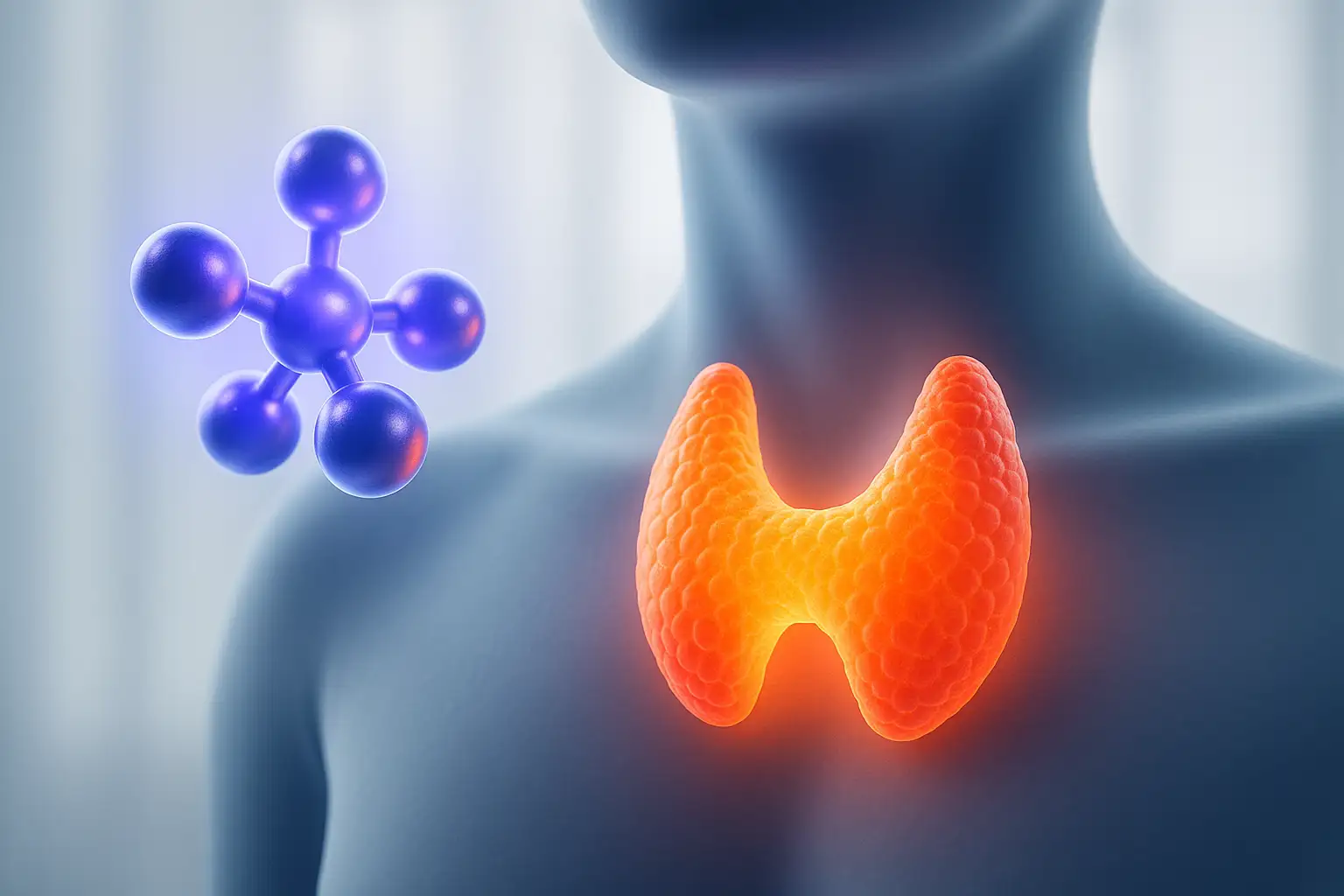Iodine, a vital nutrient found naturally in the earth’s soil and ocean waters, is crucial for human health. It plays a key role in thyroid function, aiding in the production of thyroid hormones which regulate metabolism, growth, and development. Despite its importance, iodine deficiency is a common global health issue, leading to thyroid disorders and other health problems.
Dr. Jorge Flechas, a renowned expert in the field, has extensively researched the role of iodine in the body. His work emphasizes the importance of adequate iodine intake for maintaining thyroid health and overall well-being. He advocates for a better understanding of iodine’s role in nutrition and the potential consequences of deficiency.
Iodine and Thyroid Function
Iodine plays a vital role in the health and functioning of the thyroid gland, a small butterfly-shaped gland located in the neck. This essential mineral is a key component in the production of thyroid hormones, which are crucial for regulating metabolism, growth, and development.
Role of Iodine in Thyroid Hormone Production The thyroid gland synthesizes two main hormones: thyroxine (T4) and triiodothyronine (T3). Iodine is critical in the creation of these hormones. The body absorbs iodine from dietary sources and delivers it to the thyroid. Here, iodine atoms are incorporated into the amino acid tyrosine, which leads to the production of T4 and T3. These hormones then get released into the bloodstream, where they regulate various metabolic processes. Without sufficient iodine, the thyroid struggles to produce these vital hormones, leading to several health problems.
Impact of Iodine Deficiency on Thyroid Health Iodine deficiency is one of the leading causes of thyroid disorders worldwide. When the body doesn’t get enough iodine, it can lead to hypothyroidism, characterized by symptoms such as fatigue, weight gain, and cold intolerance. In children, inadequate iodine can result in developmental issues and stunted growth. Another common result of iodine deficiency is goiter, an enlargement of the thyroid gland as it tries to absorb more iodine from the bloodstream. Prolonged iodine deficiency can have serious health consequences and is a major concern in regions where iodine-rich foods are scarce.
Iodine Sources and Dietary Recommendations
Iodine is a crucial nutrient for maintaining thyroid health and overall well-being. Understanding the natural sources of iodine and the recommended daily intake is essential for a balanced diet.
Natural Sources of Iodine Iodine is primarily found in the ocean, and thus, seafood is a rich source of this mineral. Here are some common iodine-rich foods:
- Seafood: Fish like cod and tuna, and shellfish such as shrimp, oysters, and seaweed (like kelp and nori), are excellent sources of iodine.
- Dairy Products: Milk, cheese, and yogurt, especially from cows fed with iodine-supplemented feed, can be good sources of iodine.
- Eggs: They contain iodine mainly due to the iodine content in chicken feed.
- Iodized Salt: A common and effective way to ensure adequate iodine intake, particularly in countries where it is added to table salt as a public health measure.
- Fruits and Vegetables: The iodine content in fruits and vegetables varies depending on the iodine content of the soil they are grown in. Potatoes, prunes, and green beans are examples of iodine-containing produce.
Recommended Daily Intake of Iodine The amount of iodine required depends on age, gender, and life stage. According to health authorities, the recommended daily intake of iodine is:
- Adults: 150 micrograms (mcg) per day.
- Pregnant Women: 220 mcg per day.
- Breastfeeding Women: 290 mcg per day.
- Children: The requirement varies from 90 to 120 mcg per day, depending on the age.
It’s important to maintain a balance, as both deficiency and excess of iodine can lead to health issues. Iodine deficiency can cause problems like goiter and hypothyroidism, while excess intake can lead to hyperthyroidism or thyroid gland inflammation.

Thyroid Disorders and Iodine
Understanding the relationship between iodine and thyroid disorders is crucial, as iodine plays a vital role in thyroid health. Two common thyroid disorders, hypothyroidism and hyperthyroidism, are closely linked to iodine levels.
Hypothyroidism and Iodine Deficiency Hypothyroidism occurs when the thyroid gland does not produce enough thyroid hormones. Iodine deficiency is a leading cause of hypothyroidism, as iodine is a critical component in the production of thyroid hormones. Without adequate iodine, the thyroid struggles to synthesize these hormones, leading to various symptoms such as fatigue, weight gain, cold intolerance, and depression.
The link between iodine deficiency and hypothyroidism is particularly significant in areas where iodine is scarce in the diet. Addressing iodine deficiency through diet or supplementation can often help manage and prevent hypothyroidism.
Hyperthyroidism and Iodine Levels Hyperthyroidism is characterized by the overproduction of thyroid hormones. While less directly linked to iodine intake than hypothyroidism, iodine levels can still play a role. Excessive iodine intake can trigger hyperthyroidism in some individuals, especially those with pre-existing thyroid abnormalities. This condition, known as iodine-induced hyperthyroidism, is rarer but can be serious.
Hyperthyroidism symptoms include weight loss, rapid heartbeat, anxiety, and tremors. Managing iodine intake and careful medical supervision are key in treating hyperthyroidism, especially if it is related to iodine levels.

Iodine Supplementation: Guidelines and Considerations
Iodine supplementation can be a crucial factor in maintaining thyroid health and overall well-being, especially in areas where iodine deficiency is common. However, it’s important to understand when and how to use these supplements, as well as their associated risks and benefits.
When and How to Use Iodine Supplements Iodine supplementation is typically recommended in the following scenarios:
- Areas with Iodine-Deficient Soils: People living in regions where the soil lacks iodine, leading to low iodine levels in food, may need supplements.
- Pregnant and Breastfeeding Women: Increased iodine intake is crucial during pregnancy and breastfeeding to support fetal and infant development.
- Individuals with Certain Dietary Restrictions: Those who follow diets that naturally lack iodine, such as strict vegan diets without iodized salt, may benefit from supplementation.
The method of supplementation can vary. Iodine is available in various forms, including tablets, capsules, and liquid drops. It’s essential to follow the dosage guidelines provided by healthcare professionals or as per the supplement’s instructions to avoid overconsumption.
Risks and Benefits of Iodine Supplementation Benefits of iodine supplementation include:
- Preventing Iodine Deficiency Disorders: Adequate iodine intake can prevent conditions like goiter and hypothyroidism.
- Supporting Fetal and Infant Development: Iodine is vital for brain development in infants and fetuses.
However, there are risks associated with excessive iodine intake:
- Risk of Hyperthyroidism: Excessive iodine can lead to hyperthyroidism, especially in individuals with existing thyroid issues.
- Iodine Sensitivity: Some people may be sensitive or allergic to iodine, and excessive intake can lead to adverse reactions.
Dr. Flechas’ Research on Iodine and Thyroid Health
Dr. Jorge Flechas is a prominent figure in the study of iodine and its impact on thyroid health. His research has significantly contributed to the understanding of how iodine affects the thyroid gland and overall well-being.
Key Findings from Dr. Flechas’ Studies
- Crucial Role of Iodine in Thyroid Function: Dr. Flechas’ research emphasizes that iodine is essential for the production of thyroid hormones. His studies reveal that adequate iodine intake is crucial for maintaining thyroid health and preventing disorders like hypothyroidism and goiter.
- Iodine Deficiency and Its Impacts: One of the critical findings is the widespread prevalence of iodine deficiency and its various health implications. Dr. Flechas highlights that iodine deficiency is not just a developing world issue but also affects populations in developed countries.
- Relation Between Iodine and Autoimmune Thyroid Diseases: Dr. Flechas’ studies explore the complex relationship between iodine intake and autoimmune thyroid diseases like Hashimoto’s thyroiditis, suggesting a need for a balanced approach to iodine consumption.
Case Studies and Patient Outcomes
- Dr. Flechas has documented several case studies where correcting iodine deficiency led to significant improvements in thyroid function and overall health. These include instances of reduced symptoms of hypothyroidism and shrinking of goiters.
- In some cases, proper iodine supplementation under medical supervision helped in reversing certain thyroid disorders, showcasing the potential of iodine in thyroid treatment.
Iodine in Pregnancy and Child Development
Iodine plays a critical role during pregnancy and in the early stages of child development. Understanding the importance of iodine and ensuring adequate intake is vital for the health of both the mother and the child.
Importance of Iodine During Pregnancy
- Thyroid Health: Iodine is essential for the proper functioning of the thyroid gland. During pregnancy, the demand for thyroid hormones increases, not only for the mother but also for the developing fetus. These hormones are crucial for maintaining the mother’s metabolism and ensuring the baby’s growth and brain development.
- Preventing Developmental Issues: Adequate iodine intake during pregnancy is crucial to prevent developmental disorders and congenital abnormalities. Iodine deficiency can lead to complications like cretinism, characterized by severe physical and mental impairments.
- Overall Health: Sufficient iodine levels support the overall health of the mother, reducing the risk of pregnancy-related complications.
Iodine’s Role in Fetal and Child Development
- Brain Development: Iodine is a key component in the development of the fetal brain. Deficiencies can lead to impaired cognitive functions and lower IQ in children.
- Growth: Thyroid hormones, for which iodine is essential, play a significant role in the physical growth of the fetus and young children.
- Immune System: Adequate iodine contributes to the development of a healthy immune system, reducing the risk of certain infections and diseases.

Iodine and Overall Health
Iodine, a vital nutrient found in various foods, plays a significant role in maintaining overall health, particularly in metabolic functions and immune system support.
Iodine’s Impact on Metabolic Function
- Thyroid Hormone Production: Iodine is critical for the synthesis of thyroid hormones, which regulate the body’s metabolic rate. These hormones influence various metabolic processes, including energy production, body temperature regulation, and heart rate.
- Weight Management: By regulating the metabolic rate, iodine indirectly influences body weight. A balanced iodine level helps maintain a healthy metabolism, which is crucial in weight management and energy balance.
- Developmental Metabolism: In children and adolescents, adequate iodine intake is essential for growth and development, as thyroid hormones play a key role in bone growth and brain development.
Iodine in Immune System Support
- Immune Function: Iodine contributes to the immune system’s defensive mechanisms. It is involved in the activity of immune cells and helps in the body’s response to pathogens.
- Antioxidant Properties: Iodine exhibits antioxidant properties, protecting cells from oxidative stress and damage caused by free radicals.
- Thyroid-Immune System Interaction: Since the thyroid gland influences the immune system, maintaining its health with adequate iodine intake indirectly supports immune function.
Conclusion
In summary, the role of iodine in maintaining thyroid health and overall well-being is profound and multifaceted. This essential mineral, found naturally in various foods, is critical for the production of thyroid hormones, which regulate many bodily functions. Understanding the impact of iodine on health and implementing strategies to maintain its optimal levels are key for preventing thyroid disorders and supporting general health.
Summary of Key Points:
- Iodine’s Role in Thyroid Function: Adequate iodine intake is crucial for the production of thyroid hormones, influencing metabolic rate and overall health.
- Sources and Recommendations: Iodine-rich foods include seafood, dairy products, eggs, and iodized salt. Pregnant and breastfeeding women, in particular, need to ensure sufficient iodine intake.
- Iodine in Health and Disease: Both deficiency and excess of iodine can lead to health issues such as hypothyroidism, hyperthyroidism, and developmental problems in children.
- Lifestyle Considerations: A balanced diet, regular health check-ups, and informed dietary choices are essential for maintaining healthy iodine levels.
Encouragement for Further Learning and Discussion:
- Stay Informed: Continuous learning about iodine and its health implications is vital. New research and dietary guidelines can offer deeper insights into managing iodine intake.
- Consult Healthcare Professionals: Regular consultations with healthcare providers, especially for individuals with thyroid disorders or those at risk of iodine deficiency, are crucial.
- Community Engagement: Participate in discussions and community programs focusing on nutrition and health to raise awareness about the importance of iodine.
Resources
- National Institutes of Health (NIH) – Office of Dietary Supplements: The NIH provides detailed information on iodine, including its functions, recommended dietary allowances, sources, and potential health risks.
- Website: ods.od.nih.gov
- World Health Organization (WHO): WHO offers extensive resources on micronutrients, including iodine, especially in the context of public health.
- Website: who.int
- American Thyroid Association (ATA): The ATA provides resources on various thyroid conditions, the role of iodine, and guidelines for iodine intake.
- Website: thyroid.org
- PubMed: For those interested in research studies and scientific reviews, PubMed is a comprehensive resource for finding academic and clinical studies on iodine and thyroid health.
- Website: pubmed.ncbi.nlm.nih.gov
- The Endocrine Society: This organization offers resources and scientific statements on endocrine health, including the effects of iodine on the thyroid gland.
- Website: endocrine.org
- Books and Journals: Look for books and peer-reviewed journals specializing in nutrition, endocrinology, and public health for in-depth information.
- Health Blogs and Websites: Reputable health blogs and websites often feature articles written by healthcare professionals about iodine and thyroid health.

